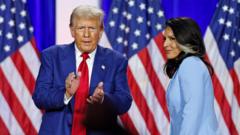United by loyalty, Trump's new team have competing agendas
If personnel equates to policy, Donald Trump’s recent appointments unequivocally illustrate his approach for a potential second term. Recent selections, some anticipated to undergo Senate scrutiny, provide insight into the administration’s direction, albeit masking layers of conflicting interests beneath a surface semblance of unity driven by loyalty toward Trump himself.
**Disruptors of the “Deep State”:**
Leading the charge against conventional policies are Matt Gaetz, Tulsi Gabbard, and Robert F. Kennedy Jr., all skeptics of President Biden’s strategies. Gaetz, nominated as attorney general, is a contentious figure, facing allegations related to ethical misconduct, yet has been a staunch critic of established governance. His controversial selection carries risks, given his history. Gabbard, a veteran and former Democratic representative, now poised to lead the national intelligence apparatus, has openly challenged common U.S. diplomatic narratives, while Kennedy, positioning himself in health oversight, has been associated with numerous alternative health theories, potentially creating friction within Trump’s agenda.
**Border Enforcement Advocates:**
Tom Homan, Stephen Miller, and Kristi Noem form another potent faction focused on stringent immigration reform. Their commitment to bolstering border security and enforcing immigration laws aligns with vocal voter concerns but could instigate conflicts, particularly with Democratic states resistant to aggressive immigration enforcement. The trio’s approach indicates a possible escalation in deportation efforts, further complicating relations with entities benefiting from immigrant labor.
**Libertarian Technocrats:**
Trump appointed industry heavyweights Elon Musk and Vivek Ramaswamy to spearhead initiatives aimed at reducing government expenditure. Musk’s $2 trillion savings proposal targets a notable shift in fiscal policy while advocating for deregulation. However, internal contradictions may arise with Kennedy’s push for increased oversight in health, suggesting an ideological clash between cost-cutting missions and regulatory frameworks.
**Geopolitical Hardliners:**
Finally, Marco Rubio, Mike Waltz, and John Ratcliffe, positioned to guide Trump’s foreign policy, embrace a stringent stance against China, reflecting rising U.S. geopolitical anxieties. Their hardline views might be at odds with Trump’s fluctuating engagement strategies, especially given past cordialities he expressed toward China’s leadership. Conflicting sentiments within this faction reflect the broader challenge of maintaining a cohesive foreign policy approach, particularly as Trump navigates his historical unpredictability regarding U.S.-China relations.
As Trump consolidates these diverse agendas into a comprehensive governance framework, managing the disharmony among these factions may prove to be a significant test of his leadership and policy coherence moving forward.




















